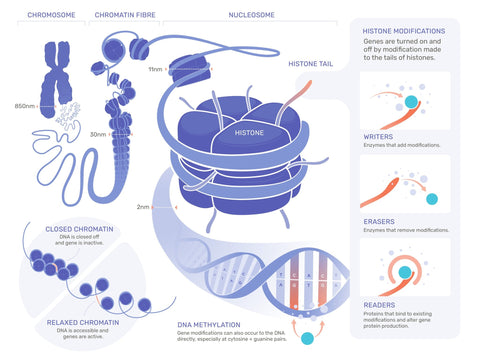In the world of medicine and science, DNA testing is not just a trend, but a revolutionary tool that gives us deeper insights into what makes us who we are. From uncovering our ancestry to predicting potential health risks, the power of DNA is fascinating. But what is really behind these tests? And how do they differ from each other? In this article, we delve into the fascinating world of DNA testing, examining its technologies, applications and what they could mean for our future. Whether you're thinking about taking a test or just curious about the science behind it, this guide will shed light on it.
Introduction to DNA testing
DNA, also known as deoxyribonucleic acid, is the molecule of life. It carries the genetic information that determines how an organism develops, grows and functions. Every cell in our body contains a copy of our DNA, and this genetic blueprint is unique to each and every one of us.
Our DNA is made up of a sequence of four chemical bases: adenine (A), cytosine (C), guanine (G) and thymine (T). These bases arrange themselves in a specific order, similar to letters in a book. In total, the human genome consists of about 3 billion of these gene letters, arranged in a unique order. This incredible amount of genetic information is packed into 23 pairs of chromosomes that are found in every cell in our body. A significant milestone in genetics was the completion of the first complete sequencing of human DNA in 2003 by the Human Genome Project.
DNA testing, once only available in forensic laboratories or research facilities, is now accessible to the general consumer. But what exactly are DNA tests? And why have they become so popular?
A DNA test is a procedure in which DNA is extracted from a sample (such as saliva, blood or skin) and then analyzed to obtain specific information about the individual. This can range from determining ancestry to identifying genetic risk factors for certain diseases.
Types of DNA tests
The fascination with our genetic makeup has led to a variety of DNA tests that serve different purposes. Basically, DNA testing can be divided into two main categories: selective genetic analysis and whole genome sequencing.
Selective genetic analysis:
This method focuses on specific sections of the genome known for particular diseases or traits. Instead of sequencing the entire genome, only selected areas are analyzed. This makes the test faster and cheaper.
- What is being investigated and why? Selective genetic analysis examines specific genes or genetic markers that are associated with known diseases or traits. For example, tests based on this method could examine the BRCA1 and BRCA2 genes for breast cancer risks or the APOE gene for Alzheimer's risks. The idea is to obtain targeted information relevant to foreseeable health concerns.
Complete genome sequencing:
This is a more comprehensive method that involves sequencing an individual's entire genome. This means that every 3 billion base pairs of DNA are analyzed.
- A deep look into your DNA: Whole genome sequencing provides the most comprehensive insight into your genetic makeup. It not only enables the detection of known genetic risk factors, but also the discovery of new genetic variants that could be identified as relevant in the future. While this method is more expensive than selective genetic analysis, it provides a complete picture of your DNA that may be valuable for future medical discoveries.
Regardless of the type of test, our reports/panels provide consistent and high-quality information. The choice of test depends on individual needs and the desired amount of information.
Applications of DNA testing
DNA testing is not only a fascinating window into our genetic makeup, but also a powerful tool in modern medicine. The applications are diverse and range from predicting disease risks to diagnosing existing diseases.
Predictive genetics: These tests are used to determine a person's risk of certain genetic diseases or conditions long before any symptoms appear. For example, people who have a family history of breast cancer can have a predictive test to determine whether they carry the BRCA1 or BRCA2 mutations that increase the risk of this disease. It is important to note that an increased genetic risk does not mean that a person will definitely develop the disease, but rather that they are at higher risk than the general population.
Genetic diagnostics: When someone shows symptoms of an illness, diagnostic DNA testing can help determine the exact cause. For example, they can be used to identify genetic causes of developmental delays in children. These tests can also help determine the exact type and form of a disease, which in turn can influence treatment decisions.
The applications of DNA testing are constantly expanding as research continues to discover new genetic markers for a variety of conditions and diseases. As technology and research advances, DNA testing is likely to play an even more central role in the personalized medicine of the future.
Both types of tests can provide valuable information that can be used to predict, diagnose, or treat disease. However, it is important to interpret the results in collaboration with a geneticist to ensure that the information is correctly understood and handled appropriately.
Interpretation and evaluations of DNA tests
Health and disease risk: By comparing your DNA to known genetic markers, scientists can identify potential health risks. It is important to note that an increased genetic risk does not necessarily mean that you will develop a disease. It simply shows increased susceptibility compared to the general population. Comprehensive DNA testing can provide clues about risks for hundreds of diseases, from common conditions like type 2 diabetes to rare genetic disorders.
Pharmacogenetics: How the body responds to medications can be partially determined by our genes. Some people may metabolize medications more quickly due to their genetic makeup, while others may be more sensitive to certain medications. By analyzing genetic markers, doctors can better understand which medications and dosages are best for a patient, minimizing the risk of side effects.
Nutrition and Fitness: Our genes can also provide insight into our nutritional and fitness needs. For example, some people may have a genetic predisposition that makes them more susceptible to deficiencies in certain vitamins. Others may have genetic variations that affect their muscle composition or their response to certain types of exercise. By understanding these genetic factors, individuals can optimize their nutrition and fitness plans.
Interpreting DNA test results requires expertise and should ideally be done in collaboration with a geneticist or other medical professional. It is also important to note that genetics are only part of the whole picture. Environmental factors, lifestyle and other variables also play a crucial role in our health and well-being.
Advantages and limitations of DNA testing
Advantages of DNA testing:
- Personalized insights: DNA testing provides personalized information tailored specifically to your genetic makeup. This can help you make more informed decisions about your health, diet and fitness.
- Predicting disease risks: Some tests can identify genetic markers that are associated with an increased risk of certain diseases. This can help you take preventive measures.
- Pharmacogenetic information: As previously mentioned, DNA testing can provide clues about how you might react to certain medications, which can lead to safer and more effective medication.
- Researching Ancestry: Many people use DNA testing to learn more about their family origins and ancestry.
Limitations of DNA testing:
- Not conclusive: A DNA test cannot reveal all genetic risks or potential. There are still many unknown factors in human genetics.
- Environmental factors: Genetics are only one piece of the puzzle. Environment, lifestyle and other factors play an equally important role in determining our health and well-being.
- Privacy Concerns: There are concerns about the privacy and security of genetic data. It is important to ensure that your data remains secure and private.
- Possible misinterpretation: Without the right advice or understanding, the results of a DNA test can be misunderstood or misinterpreted.
While DNA testing is a powerful tool in our arsenal for better understanding our health and ancestry, it is important to recognize its limitations and see it in context. A DNA test is part of a bigger picture and should be considered in combination with other information and under the guidance of professionals.
Ethics and data protection: your DNA and your privacy
When it comes to genetic information, it is some of the most personal and intimate data an individual can possess. DNA testing offers deep insights into your health, ancestry and other personal aspects. It is therefore crucial that this data is treated with the utmost care and integrity
Maximum data protection: Before your DNA sample is analyzed, it is anonymized. This means that all personal identifying information is removed so your sample cannot be directly linked to you. This ensures that your genetic data is never linked to your identity.
No data sharing: Your genetic data belongs to you and only you. They will never be sold or passed on to third parties without your express consent. This excludes both commercial partners and third parties such as insurance companies or employers.
Highly secure servers: Your genetic data is stored on highly secure servers that use state-of-the-art security protocols and technologies. This ensures that your data is protected from unauthorized access.
Full control: You have full control over your genetic data at all times. This means that you also have the right to completely delete your data at any time.
Ethics in genetic research: In addition to data protection, the ethical handling of genetic data is also of utmost importance. This means that the data will only be used for the purpose you intended and not for other undisclosed research purposes.
Protecting your genetic data is our top priority. With strict privacy policies and state-of-the-art technology, you can be confident that your DNA information is kept safe and confidential.
Future of DNA Testing: Current Trends and Future Developments
DNA testing has experienced rapid development in recent years. What was once a complex and expensive process has now become accessible and affordable for many people. But where does this path lead?
-
Advanced applications in medicine: Personalized medicine is the focus of many research projects. In the future, DNA testing could help create individualized treatment plans for patients based on their genetic makeup.
-
Integration into everyday life: Wearables and other health technologies could in the future be integrated with genetic data to provide personalized health and fitness advice in real time.
-
Advanced ancestry research: In addition to health-related information, DNA testing also provides insights into ancestry. Future tests could provide even more detailed information about ancestral origins and migration.
-
Improved data protection measures: As the importance of DNA testing grows, protecting this data also becomes increasingly important. Future technologies could offer even safer and more transparent methods of storing and processing genetic data.
- Accessibility and Education: As DNA testing becomes more accessible, education around genetics and genomics also becomes more important. This could lead to a more informed public able to make informed decisions about their genetic health.
DNA testing has the potential to profoundly change the way we think about health, ancestry and ourselves. It remains exciting to see how this technology develops and what new possibilities it will offer in the future.



